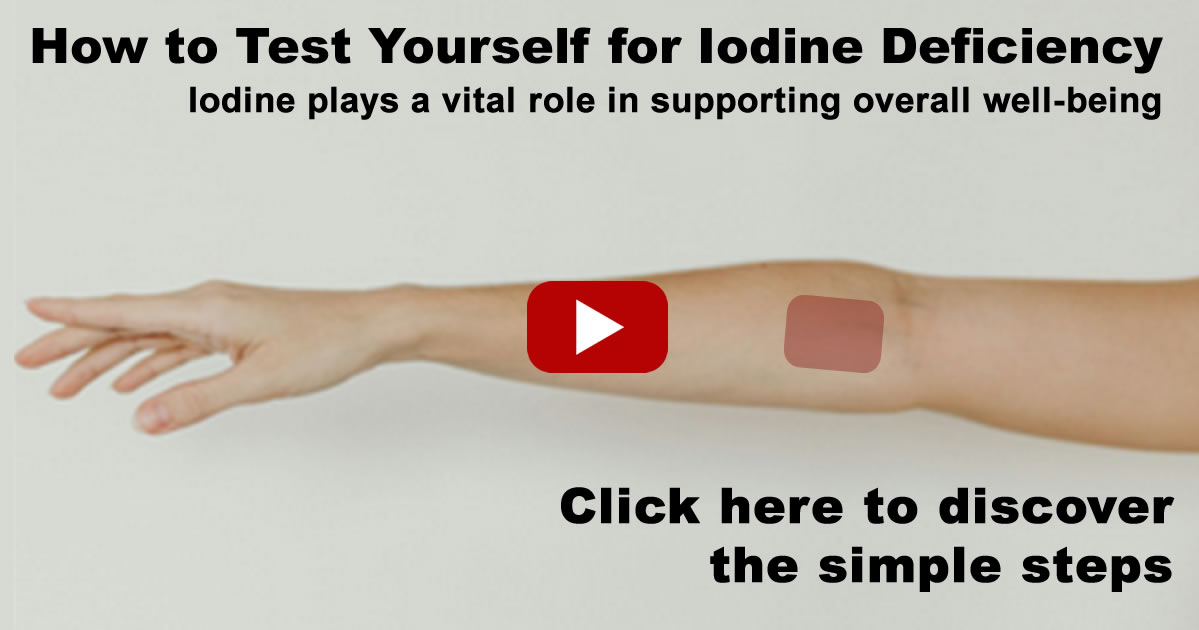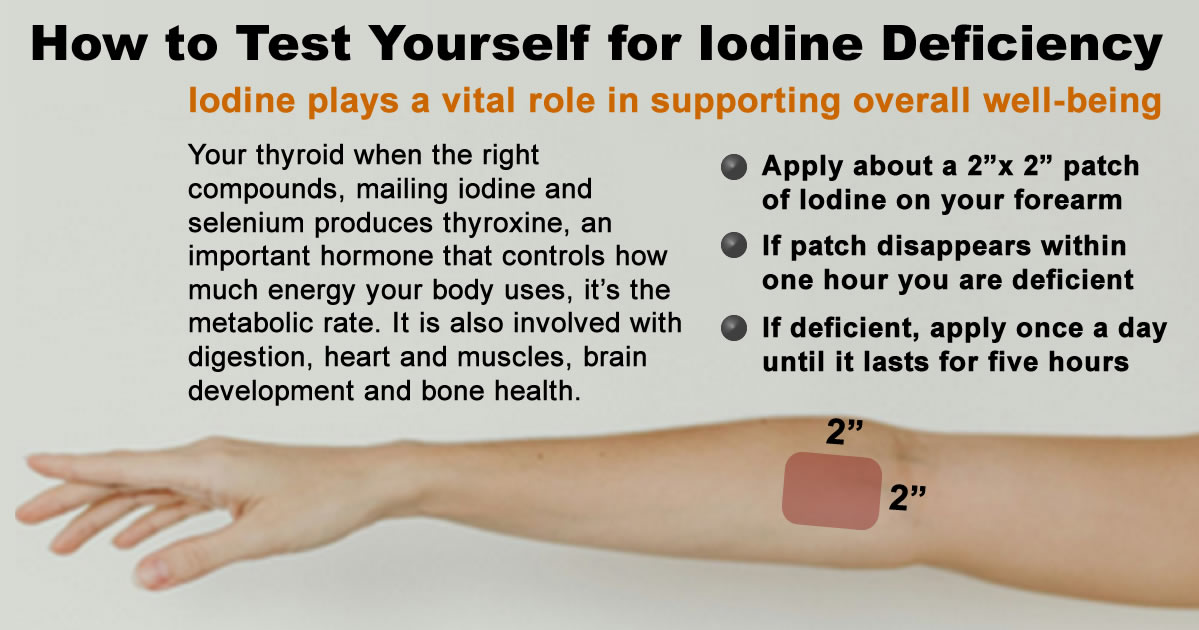How to Test for Iodine Deficiency
Iodine was discovered in 1811 by French chemist Bernard Courtois. It was later recognized for its essential role in human health. Iodine is a trace element that is crucial for the proper functioning of the thyroid gland, which produces hormones that regulate metabolism. While iodine deficiency can lead to various health issues, it was not until the early 20th century that its importance became widely recognized.
Simple Test to Determine if You Are Iodine Deficient
Iodine in Natural Health: Iodine is often discussed in the context of natural health, as it plays a vital role in supporting the body’s overall well-being. Many natural health enthusiasts emphasize the importance of obtaining essential nutrients from whole foods, and iodine is no exception. It is found in various food sources, with some of the highest concentrations present in certain types of seafood, seaweed, and dairy products.
Top Health Benefits of Iodine:
- Thyroid Function: Iodine is a critical component of thyroid hormones, such as thyroxine (T4) and triiodothyronine (T3). These hormones are essential for the proper functioning of the thyroid gland, which regulates the body’s metabolism[i]. Adequate iodine intake is crucial for preventing thyroid disorders, including hypothyroidism[ii] and goiter[iii].
- Cognitive Function: Iodine is important for brain development and cognitive function, especially in infants and young children. Adequate iodine during pregnancy is vital for the normal development of the baby’s brain and nervous system. Severe iodine deficiency during pregnancy can lead to intellectual disabilities in the child[iv].
- Immune System Support: Iodine has been recognized for its antimicrobial properties. It can help support the immune system by acting as a natural disinfectant. Iodine is sometimes used topically to clean wounds and prevent infections. Additionally, it plays a role in the body’s defense against pathogens[v].
- Detoxification: Iodine is involved in the detoxification process in the body. It can help eliminate toxic chemicals and heavy metals, promoting overall health. Some natural health practitioners suggest that iodine supplementation may support the body’s ability to remove harmful substances[vi].
- Breast Health: Iodine is concentrated in breast tissue, and research suggests that it may play a role in maintaining breast health. Some studies have explored the potential link between iodine deficiency and an increased risk of breast conditions. However, more research is needed to fully understand the relationship[vii].
- Radioactive Uptake Inhibition: One of the most well-known benefits of iodine in the context of radiation protection is its ability to inhibit the uptake of radioactive iodine by the thyroid gland. The thyroid is particularly susceptible to absorbing radioactive iodine, which can lead to an increased risk of thyroid cancer. By ensuring the thyroid has an adequate supply of stable, non-radioactive iodine, the uptake of radioactive iodine is reduced, helping to protect the thyroid from potential damage[viii].
- Nuclear Emergency Preparedness: In cases of potential nuclear emergencies or accidents, public health measures often include the distribution of stable iodine supplements. This is done to ensure that individuals have sufficient levels of non-radioactive iodine in their bodies, thereby reducing the absorption of radioactive iodine. Such preventive measures are a vital component of emergency preparedness and can significantly mitigate the health risks associated with radiation exposure[ix]–[x].
- Reduction of Thyroid Cancer Risk: Exposure to radioactive iodine is a known risk factor for thyroid cancer. By maintaining optimal levels of stable iodine, the risk of radioactive iodine absorption is reduced, subsequently lowering the risk of developing thyroid cancer. This preventive aspect underscores the importance of iodine in protecting individuals, especially those living in proximity to nuclear facilities or in areas prone to nuclear accidents[xi].
It is important to note that while iodine is effective in protecting the thyroid against radioactive iodine, it does not provide general protection against all forms of radiation. Other protective measures, such as evacuation and the use of shielding, are also crucial in minimizing overall radiation exposure.
In conclusion, iodine’s role in protecting the thyroid from the harmful effects of radioactive iodine is a critical aspect of radiation safety. Public health measures, including the distribution of stable iodine supplements in high-risk scenarios, contribute to minimizing the health risks associated with potential exposure to radioactive iodine isotopes.
Removal of Iodine from Flour in the United States: In the United States, iodine was added to table salt in the 1920s as a public health measure to address iodine deficiency and its associated health issues. However, in 1969, the U.S. Food and Drug Administration (FDA) permitted the use of bromine as a dough conditioner in bread, leading to a decline in the use of iodine in flour, which was finally eliminated from flour in the 1970’s[xii]. As a result, iodine intake from bread and baked goods decreased, contributing to concerns about iodine deficiency in certain populations.
Foods with the Highest Amount of Iodine: Several foods are rich in iodine, including:
- Seaweed and Seaweed Products: Seaweed, such as kelp and nori, is exceptionally high in iodine.
- Fish and Seafood: Fish, especially saltwater varieties like cod and tuna, contain significant amounts of iodine.
- Dairy Products: Milk, cheese, and yogurt are good sources of iodine.
- Eggs: Eggs, particularly those from chickens fed iodine-supplemented feed, contain iodine.
- Iodized Salt: Iodized table salt is a common source of iodine in the diet.
In conclusion, iodine is a vital element for maintaining overall health, with significant impacts on thyroid function, cognitive development, immune support, detoxification, and breast health. While natural health advocates often emphasize obtaining nutrients from whole foods, iodine supplementation may be necessary in certain cases, especially for those at risk of deficiency. As with any nutrient, maintaining a balanced and varied diet is crucial for optimal health. If considering iodine supplementation, it’s advisable to consult with a healthcare professional to ensure appropriate dosages and prevent the risk of excessive intake.
Citations
[i] Leung A, Pearce EN, Braverman LE. Role of iodine in thyroid physiology. Expert Rev Endocrinol Metab. 2010 Jul;5(4):593-602. doi: 10.1586/eem.10.40. PMID: 30780803.
[ii] https://www.mayoclinic.org/diseases-conditions/hypothyroidism/expert-answers/hypothyroidism-iodine/faq-20057929
[iii] Triggiani V, Tafaro E, Giagulli VA, Sabbà C, Resta F, Licchelli B, Guastamacchia E. Role of iodine, selenium and other micronutrients in thyroid function and disorders. Endocr Metab Immune Disord Drug Targets. 2009 Sep;9(3):277-94. doi: 10.2174/187153009789044392. Epub 2009 Sep 1. PMID: 19594417.
[iv] https://ods.od.nih.gov/factsheets/Iodine-HealthProfessional/
[v] Iannaccone M, Ianni A, Elgendy R, Martino C, Giantin M, Cerretani L, Dacasto M, Martino G. Iodine Supplemented Diet Positively Affect Immune Response and Dairy Product Quality in Fresian Cow. Animals (Basel). 2019 Oct 25;9(11):866. doi: 10.3390/ani9110866. PMID: 31731565; PMCID: PMC6912399.
[vi] Mei-li G, Lin L, Xin Z, Hong-mei S, Li-Xiang L, Jun YU, Xiao-hong JI, Xue YU. Influence of iodine on mRNA expression of iodide transporter, insulin-like growth factor I and transforming growth factor-beta in thyroid and mammary glands of lactating rats. Chin J Endemiol. 2012;31(3):245–250.
[vii] Rappaport J. Changes in Dietary Iodine Explains Increasing Incidence of Breast Cancer with Distant Involvement in Young Women. J Cancer. 2017 Jan 13;8(2):174-177. doi: 10.7150/jca.17835. PMID: 28243321; PMCID: PMC5327366.
[viii] Dreger S, Pfinder M, Christianson L, Lhachimi SK, Zeeb H. The effects of iodine blocking following nuclear accidents on thyroid cancer, hypothyroidism, and benign thyroid nodules: design of a systematic review. Syst Rev. 2015 Sep 24;4:126. doi: 10.1186/s13643-015-0106-3. PMID: 26420738; PMCID: PMC4588908.
[ix] https://ods.od.nih.gov/factsheets/Iodine-HealthProfessional/
[x] Arora R, Chawla R, Marwah R, Kumar V, Goel R, Arora P, Jaiswal S, Sharma RK. Medical radiation countermeasures for nuclear and radiological emergencies: Current status and future perspectives. J Pharm Bioallied Sci. 2010 Jul;2(3):202-12. doi: 10.4103/0975-7406.68502. PMID: 21829316; PMCID: PMC3148625.
[xi] Chen ZX, Xu WM, Huang YM, Jin X, Deng J, Zhu SJ, et al. Associations of noniodized salt and thyroid nodule among the Chinese population: a large cross-sectional study. Am J Clin Nutr. 2013;98:684–92.
[xii] https://mountainwellbeing.com/iodine-crisis-interview-lynne-farrow/


